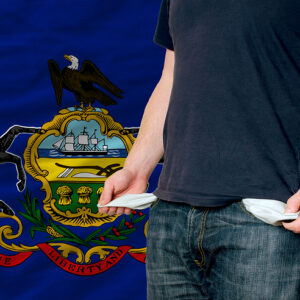Pennsylvania’s Independent Fiscal Office (IFO) issued a stern warning to the state government this month: get your fiscal house in order or risk losing the $6.6 billion surplus next year. It’s a scary scenario for the state, particularly with an aging population that’s relying more on government services.
The IFO’s latest deficit update projects the state government will spend $8 billion more than it takes between Fiscal Years 2023 and 2026. That includes nearly $900 million in deficit spending in the current year despite tax revenue exceeding expectations by $273 million.
“This is a chronic problem in Pennsylvania,” said Elizabeth Stelle, director of policy analysis at the Commonwealth Foundation.
The IFO revised revenue projections this month, shortly after Democratic Gov. Josh Shapiro signed a $47.6 billion budget into law. The spending plan included a nearly 5 percent spending increase from last year.
Where Shapiro’s office and the IFO disagree is on tax collections. The Governor’s Office predicts more than $46 billion will be deposited into the bank next year. The IFO believes the revenue estimate is $320 million lower.
“Simple math tells us that we should not be spending more than what we bring in,” Rep. John Lawrence (R-Chester) told DVJournal. “This rate of spending is simply not sustainable.”
IFO projections agree. With spending expected to hit about $47.6 billion in Fiscal Year 2024, more than $3.3 billion from the General Fund surplus would be wiped out.
The state would have a $2.9 billion surplus going into FY 2025. But the IFO doesn’t think that money will be around for much longer. It’s projected expenditures of $49.4 billion versus revenue of $46.4 billion.
That would leave a $1.5 billion deficit and, according to Stelle, “some hard decisions.”
How does the Pennsylvania government fix its budget issues? That depends on who you ask.
Rep. Josh Kail (R-Beaver) told DVJournal he believes fiscal stability and growth are the best way to protect Pennsylvanians.
“Let’s grow the tax base, bring people to Pennsylvania, and create family-sustaining jobs,” he said.
Shapiro has long argued the government should tap into the state’s Rainy Day Fund to fill the budget hole. The fund’s balance would be $7.7 billion in FY 2025, according to IFO projections.
“Over time, politicians have taken $14 billion more of your money than they’ve invested back in,” said Shapiro last month when discussing the Rainy Day Fund balance. His office did not respond to DVJournal’s request for a comment on the IFO report.
Legislative Democrats appear to be in lockstep with Shapiro on using the Rainy Day Fund. Sen. Vincent Hughes (D-Philadelphia) said earlier this year the reserve fund should be tapped for some expenses because the state’s economy was doing well. He’s pushed to use the cash for education and economic programs.
However, there are specific rules to prevent the government from tapping the Rainy Day Fund whenever it wants.
The state Constitution allows the government to use reserve funds only when there’s an emergency involving the health, safety, or welfare of Pennsylvanians. Money can also be withdrawn if a recession hits that causes “significant unanticipated revenue shortfalls” that the normal budgeting process can’t fix. There are also rules preventing reserve funds from being used to start new programs.
More importantly, the Constitution requires a two-thirds vote in the House and Senate before any Rainy Day Fund cash can be spent. It’s unlikely that Shapiro gets his wish due to the current makeup of the Pennsylvania Legislatures with Republicans controlling the Senate and Democrats controlling the House.
Stelle argued there’s a third way to get to a balanced budget without illegally raiding reserves: spend less.
She told DVJournal smaller spending increases lets the government reduce its deficit and balance out its books. “Just like taxpayers in the household must maintain.”
It’s not easy, admitted Stelle, “when you’re dealing with other peoples’ money.”
Nor will it be easy with the expected $1.5 billion deficit FY 2025. Stelle suggested the state cut taxes and end corporate welfare to help fill the budget hole.
If that doesn’t happen, then Stelle fears the state will have to make difficult decisions and start to cut services.
“That’s a place that no one wants to go,” she said.
Please follow DVJournal on social media: X@DVJournal or Facebook.com/DelawareValleyJournal

